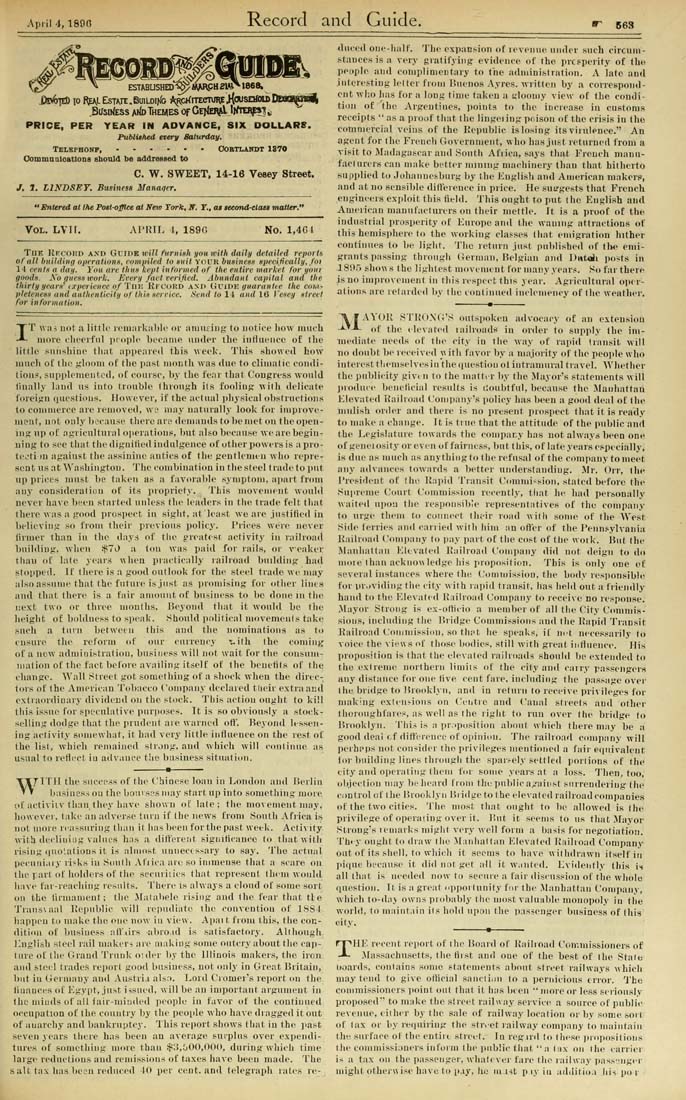Columbia University Libraries Digital Collections: The Real Estate Record
Use your browser's Print function to print these pages.
Real estate record and builders' guide: v. 57, no. 1464: April 4, 1896

Text version:
Please note: this text may be incomplete. For more information about this OCR, view About OCR text.
April 4,1890 Record and Guide. 563 .Od^teD 10 Rf^LEsT^n.BuiLDiffc -Ap,ci(rrE(rruRE>{dii(-e beneficial results is doubtful, because the ]\Iaiiliaftau Elevated Uailioad Company's policy has been a good deal of the mulish order and there is no present pio.spect that it is ready to make a change. It is tine that the attitude of the public and the Legislature towards the company has not always been one of geneiosifj'orcveuof f.iiruess, but this, of late years especially, is due as luueli as anythingto the refusal of the company to meet any advances towards a better understanding, Mr. Orr, tlie I'resideiit of the Kapid Transit Commi-^sion. stated before the Supreme ('ourt Commission recently, that he had personally waited uiion the responsible repiesentntives of the company to urge them to connect their road wiih some of the West Side ferries and carried with liini an offer of the Pennsylvania Kailioad Company to pay part of the cost of tiie work. But the .Alanliattau Elevated Kailioad Coiniiany did not deign to do iiioie than acknowledge his proposition. This is only one of several instances where the (Commissiou, the body resiionsible for oi-,)vidiiig tlie city with rajiiil tiausit, has held out a friendly hand to the Elevated Kailioad Company to receive no response. .Ma.yor Strong is ex-ofliiio a member of all the City Coinmis- sious, including the lividge Commi.ssions aud the Kaiiid Transit Kailioad Coniinission. so that he speaks, it net necessarily to voice the views of those bodies, still with great influence. His proposition is that the elevated railroads should be extended fo tho extreme northern liiuiis of the cit.y and carry passengers auy distance for one five cent fare, including the passage over the bridge to Brooklyn, and in returu to receive privileges for making extensions on Centre aud Canal stieets aud ofher fhoroughfares, as well as the right to run over the bridge to Brooklyn. This is a iir.ipositiou about w hich there may be :i good deal (f dift'ereuce of opiuidii. The railroad c(Oii]iany will perhi'ps not consider tho privileges mentioned a fair eipiivalent for building lines through the spar.-ely settled portions of the city and operating them for some years at a loss. Then, too, olijeetion may b(-heard from the public against surrendering the coutrol (if the ISiooklyn Biidge to I he ele\atcd railroad companies of the two cities. The most that ought to lie allowed is Ihe privilege of operaling over it. But it seems fo us that Mayor Strong's lemaiks iniglif very well form a basis for negotiation. Th< y ought to draw llie Manlialfan Elevated Kailioad Company out of its shell, to which it seems to have willidrawn itself in pii|ue bei-aiise it did not get all it iv.nited. Evidently this is all that is needed uow to secure a fair discussion of the wholo (inestion. It is :i great opporluuity for the Manhattan Company, \vhich to-da.y owns probably the most valuable monopoly in the world, to uoiint.iin its hold iipnii the iiassenger business of Ihis city. THE recent report of the Board of Kailioad Coir.inissioneis of Massachusetts, the ttist aud one of the best of Ihe Stale boards, contains siuiie statements about street railways which may tend to give ofticial sanciiiin to a pernicious error, 'J'he commissioners point out that it has been "moreor less seriously proposed"' to make the street railway service, a source of public revenue, eilher by the sale of railway location or by some sort of tax or by requiring the street railway ciunjiany to maintain the surface of the entire strei-f. In regird to fliese pioposilions Ihe commissioners inform the pnblic that "a lax on Ihe carrier i-i a tax on the passenger, whati ver fare the rail way pass-nger might otherwise have to p.iy, he mut p ly iu aiUlitio.i hi-s por